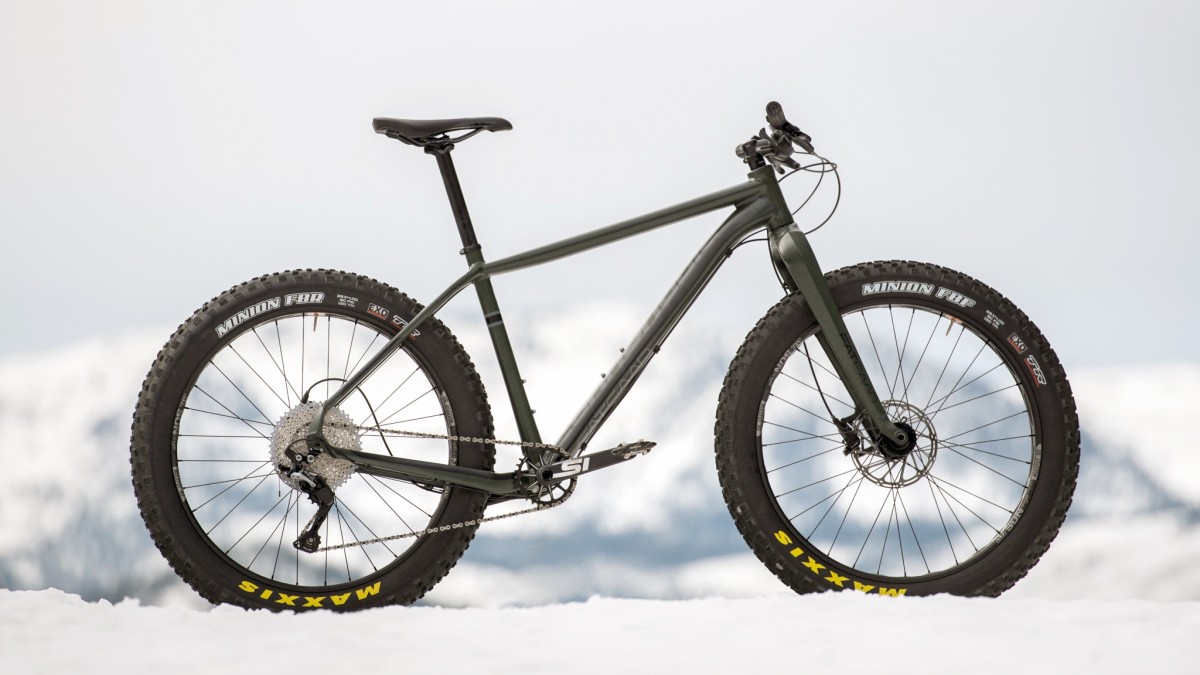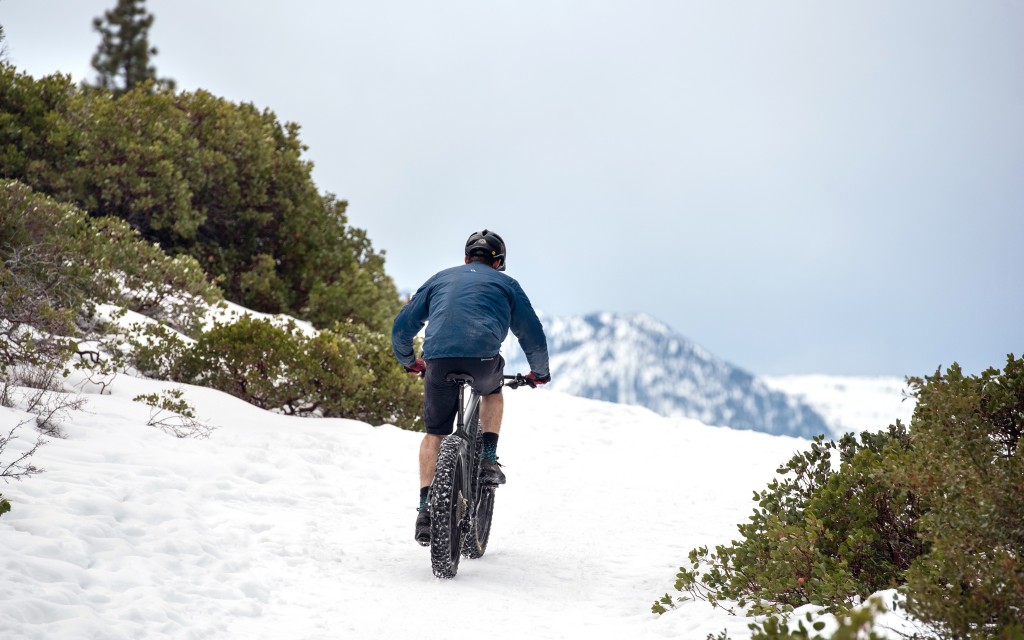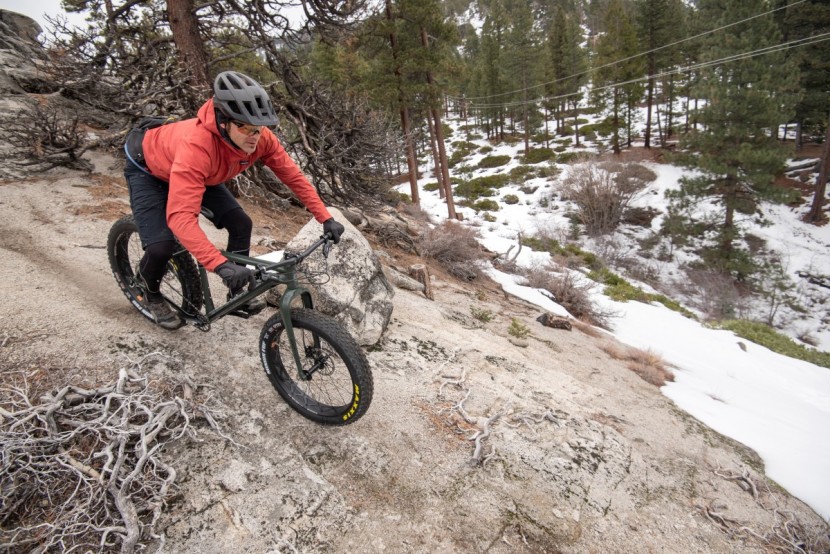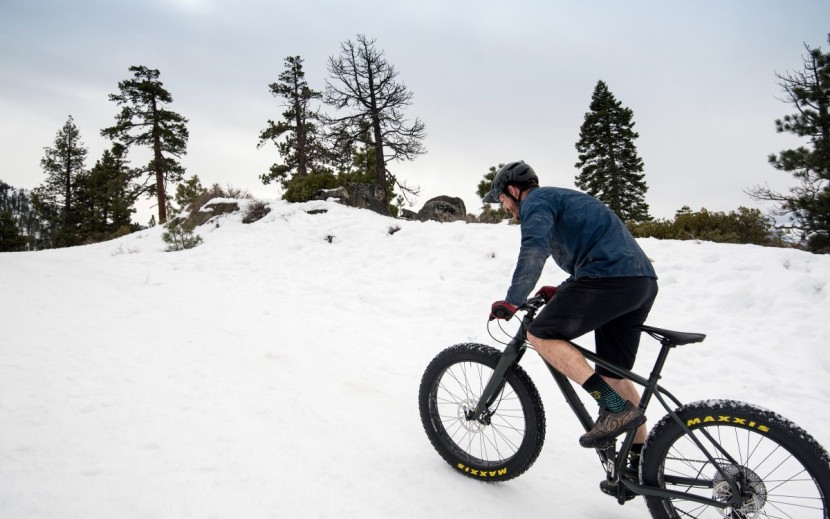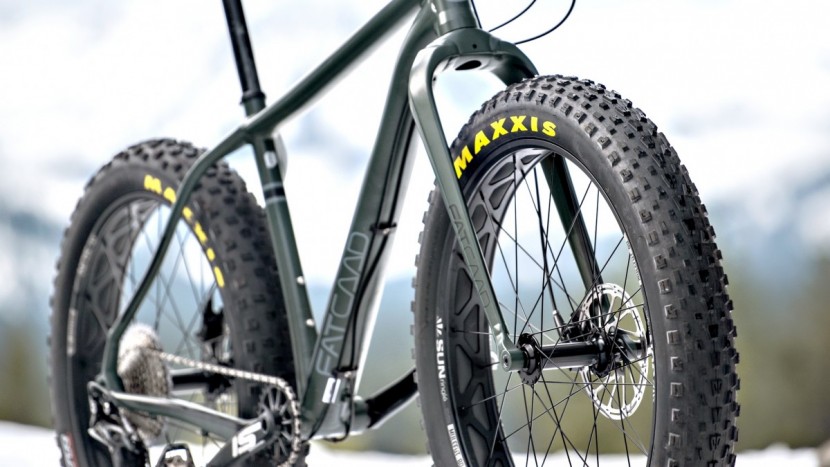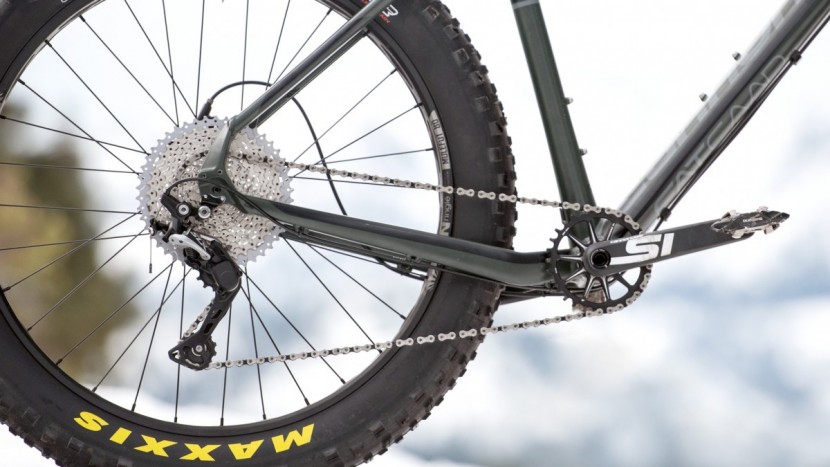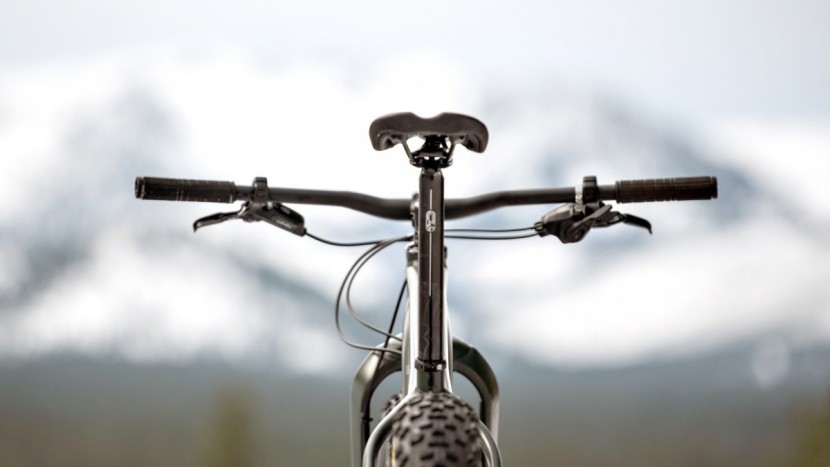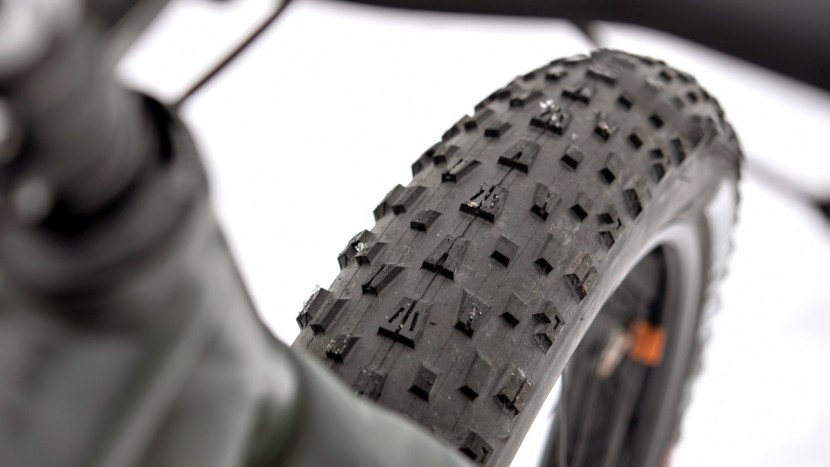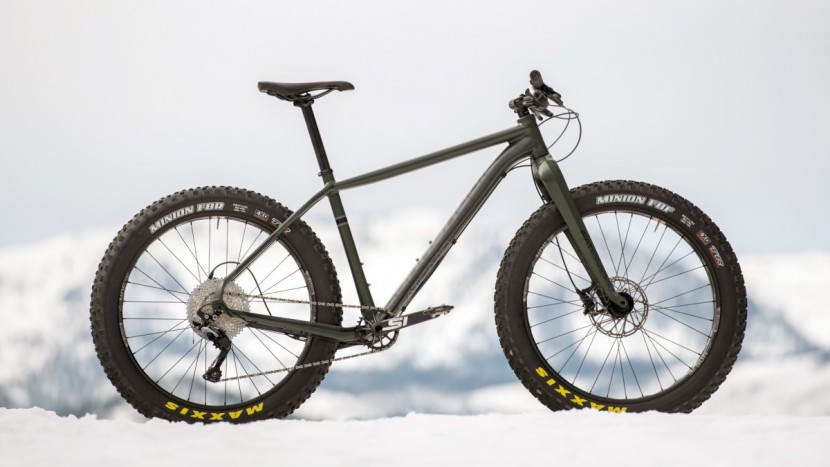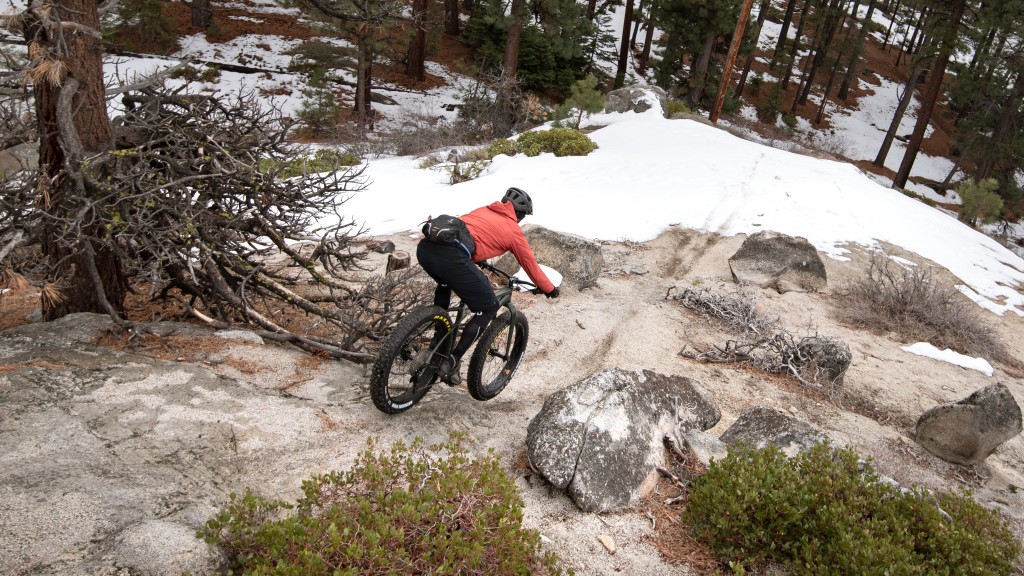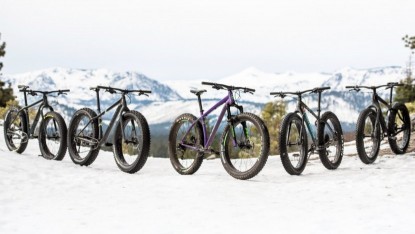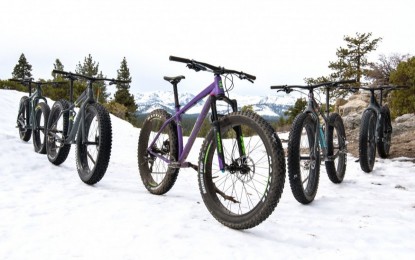Cannondale Fat CAAD 2 Review
Our Verdict
Our Analysis and Test Results
The Fat CAAD 2 is one of just two models of fat bikes offered by Cannondale. As their entry-level model, it is reasonably priced and has a component specification that is quite similar to several of the other bikes in this review. We tested the Fat CAAD 2 for a couple of months on groomed and packed snow trails as well as dirt singletrack. Testers found its overall performance to be decent, but it couldn't quite match the competition due mostly to its more awkward feeling old school geometry.
Downhill Performance
The Fat CAAD 2 is one of several rigid fat bikes in this test, so it came as no surprise that it preferred to be ridden on smooth snow or dirt trails. Thanks to this bike's long chainstays, 463mm, and moderately long wheelbase of 1175mm, it is best suited to carrying speed on smooth and flowy terrain where it feels stable and planted. The long chainstays have the unfortunate side effect of making it tougher to get the front end of the bike off the ground and made it feel much less lively and playful than other bikes in our test. The 69.3-degree head tube angle is pretty close to all the other models in the test, but the lower height of the front end makes it feel steeper than that and consequently a bit less confidence-inspiring on steeper sections of descending.
Uphill Performance
In general, the uphill performance of the Fat CAAD 2 is fine, but due to the more awkward feeling geometry of this bike it isn't quite as comfortable as the competition. This is largely due to the low front end which makes the rider break more at the waist into a more aggressive feeling position. At 457mm, the reach isn't incredibly long or anything, it's more that you have to reach down a little bit more that feels awkward. Beyond this less comfortable rider position, the bike climbs reasonably well. There is adequate range provided by the 1 x 11-speed drivetrain and the 4.0" Maxxis Minion FBF, and FBR tires offer a good level of floatation and plenty of traction on most surfaces. The bike's long, 463mm, chainstays also help to keep the front end planted even when the going gets steep. Overall, the climbing performance of the Fat CAAD 2 is one of its best attributes; testers just preferred the comfort of the other bikes in this test more.
Versatility
The Fat CAAD 2 is a relatively basic rigid fat bike that is best suited to smooth snow, dirt, or mixed condition riding. The bike's lower front end puts the rider in a slightly more aggressive riding position that is best for grinding away on XC style trails. It lacks the versatility of some of its competitors due to its shortage of accessory mounts on the frame and fork, making it less ideal for bike packing and adventure riding.
Build
Cannondale's Fat CAAD 2 has a modest component specification that is pretty nice considering the asking price of this bike. It's built around Cannondale's Fat CAAD Smartform C1 Alloy frame with their Fatty Rigid alloy fork up front. Axle spacing is somewhat standard for modern fat bikes with a 15 x 150mm front and 12 x 197mm rear thru axles. This frame has relatively standard water bottle mounts within the front triangle, but virtually no other accessory mounting options otherwise.
Drivetrain duties are controlled by a Shimano SLX 11-speed shifter and rear derailleur with a Sunrace 11-46 tooth cassette and Cannondale Si cranks with a 30 tooth front chainring. This drivetrain configuration provides ample range and the Shimano shifting was crisp, precise, and worked flawlessly during testing. The Fat CAAD 2 is equipped with SRAM Level hydraulic disc brakes with 180mm front and 160mm rear brake rotors. These brakes are similar to those found on several other fat bikes we tested and work adequately for the lower speeds typically reached while riding these big wheeled rigs.
Like most Cannondale bikes, the Fat CAAD 2 comes clad with numerous house brand Cannondale parts. Most of these are in the cockpit and include the stem, 760mm wide handlebar, and the grips. The width of the handlebar and length of the stem feel good, but testers weren't fond of the non-lock-on grips. The slip-on grips they chose move around a fair amount and didn't do this otherwise well-equipped bike any favors. Cannondale has also spec'd a standard alloy seat post and saddle, both house brand, and again, the saddle was one of our least favorite in the test. Both the saddle and grips are relatively inexpensive to upgrade to something more appealing, so not a deal breaker by any means. As with a few of the other bikes in this review, we'd much prefer a quick release seat post clamp for raising and lowering the saddle more efficiently.
When it comes to wheels and tires, we might sound a bit like a broken record because all of the fat bikes we tested have some sort of SUNringle Mulefut wheels. The Fat CAAD 2 has 26" SUNringle Mulefut 80 SL rims laced to SUNringle SRC hubs. Maxxis Minion FBF and FBR 4.0" EXO tires are mounted up and provide plenty of air volume and excellent traction.
Geometry
On paper, the geometry numbers of the Fat CAAD 2 look somewhat similar to the other rigid fat bikes in this review. Interestingly, it doesn't translate quite as well on the trail, and this bike has a decidedly old school feel to it. Trek has gone with a conservative, but pretty standard for a fat bike, head tube angle of 69.3 degrees and a 73.6-degree seat tube angle. These numbers are right about where the other bikes measure give or take a degree or so. While 69.3-degrees sounds steep for a head tube angle by today's standards, it works for a rigid fork, especially one that is meant for riding in snow and you won't be likely to tackle the steepest and most technical descents on. The 73.6-degree seat tube angle is a reasonable middle ground that puts the rider up above the bottom bracket and allows for good power transfer and traction on the rear tire. The reach of 457mm is also middle of the road, but testers found the front end of this bike to feel low, we measured it at 909mm in a straight line from the ground to the top of the head tube. This lower front end makes you break a little more at the waist and puts you into a more aggressive position while climbing or seated pedaling. Testers preferred the more comfortable position offered by bikes with a slightly higher front end.
The 1175mm wheelbase is also moderate in length, long enough to give the bike some stability at speed, but not so long that it becomes unwieldy in tighter terrain or when making turns. The 463mm long chainstays are among the longest in this test and surprising given the 26" wheel size of this bike. The long chainstays do help with stability somewhat but certainly make it harder to get the front end of this bike off the ground and are one of the reasons this bike feels less playful than the competition.
Value
Like many of the big bike manufacturers, Cannondale bikes aren't known for being inexpensive. So, at a retail price of $2,100, we were pleasantly surprised by the price of the Fat CAAD 2. The alloy frame is reasonably lightweight, and the component specification is pretty good considering the asking price. Since our testers preferred the performance of the other models in this test, we'd be less inclined to recommend it over any of the competition.
Conclusion
On paper, the Fat CAAD 2 looks relatively similar to several of the other models in this review. In practice, the whole package doesn't come together all that well out on the trail, and this bike has an awkward feeling geometry that makes it less comfortable and confidence-inspiring to ride than the competition. The bike's low front end is tough to get used to, and the long chainstays make this bike feel more sluggish and lifeless comparatively speaking. It gets the job done; it just feels a bit outdated and old school in the process.
Other Versions and Accessories
Cannondale makes two models of Fat CAAD including the Fat CAAD 2 reviewed above. The Fat CAAD 1 ($3,360) is their top of the line model that comes with their Fat CAAD alloy frame and a Lefty OLAF 100mm suspension fork. It comes equipped with a SRAM GX Eagle 12-speed drivetrain, SRAM Guide R brakes, and a Tranz-X 120mm dropper seat post.


